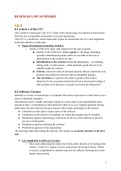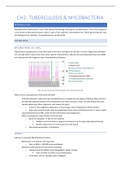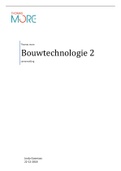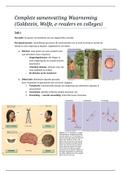BUSINESS LAW SUMMARY
Ch. 8
8.1 Article 2 of the UCC
The Uniform Commercial Code (UCC) deals with a broad range of commercial transactions,
from the use of negotiable instruments to secured transactions.
The UCC is a model law, which means that it must be enacted into law by a state legislature
to become effective in that state.
● Types of Contracts Covered by Article 2
○ Article 2 of the UCC deals with contracts for the sale of goods.
■ Section 2-105 of the UCC defines goods as “all things (including
specially manufactured goods) which are movable at the time of
identification to the contract for sale.”
■ Identification to the contract means the designation— by marking,
setting aside, or other means—of the particular goods that are to be
supplied under the contract.
■ Fixtures, which are items of personal property that are attached to real
property and cannot be removed without substantial damage.
■ The merchant as “a person who deals in goods of the kind or
otherwise by his occupation holds himself out as having knowledge or
skill peculiar to the practices or goods involved in the transaction.”
8.2 Software Licenses
Software is a series of instructions to a computer that can be expressed in written form or as a
series of electronic impulses.
The software can be “readily and easily copied on a mass scale in an extraordinarily short
amount of time” or distributed on the Internet for little or no cost. Vendors generally license,
rather than sell, their software because licenses offer certain advantages to the licensor.
● Limitations on the right to make copies of the software
● Limitations on the number of computers on which the program may be installed
● Prohibitions against sublicensing, restrictions on the use of the software to provide
services to third parties
● Prohibitions against modifying the software
● Prohibitions against reverse engineering.
By licensing rather than selling the software, the vendor can avoid the doctrine of the first
sale.
● Law Applicable to Software Licenses
○ Most cases addressing the subject have held, either directly or by analogy, that
Article 2 of the UCC applies to most transactions involving software. Efforts
to create a comprehensive uniform state law for software licensing have been
largely unsuccessful.
1
, ■ Principles of the Law of Software Contracts, which reviews the
existing case law and recommends best practices for use by judges and
lawyers.
● The interplay between License Provisions and Intellectual Property Law
○ License restrictions have been challenged and, in some cases, invalidated, on
the basis that they conflict with applicable intellectual property law, violate
public policy, or are unconscionable. Two types of provisions are particularly
susceptible to attack:
■ (1) provisions that purport to expand the exclusive rights conferred by
copyright or other intellectual property laws
■ (2) provisions that narrow statutory or common law limits on the
owner’s exclusive rights, including terms restricting distribution of
non-copyrightable factual information, prohibiting assignment,
mandating grant-back licenses, and prohibiting reverse engineering.
8.3 Contract Formation
Section 2-204 provides that a “contract for the sale of goods may be made in any manner
sufficient to show agreement, including conduct by both parties which recognizes the
existence of such a contract.”
● Offer
○ The UCC does not define the term offer, although it is used in several
important sections. Therefore, traditional common law principles determine
whether an offer has been made.
● Acceptance
○ The UCC does not define acceptance, either. Unless the offeror indicates
unambiguously that his or her offer can be accepted only in a particular way,
an offer may be accepted in any manner and by any medium that is reasonable
under the circumstances. If, however, the response is not timely or indicates
only a willingness to continue negotiations, it is not an acceptance.
○ The UCC abolished the common law mirror image rule, which requires the
acceptance to contain the exact same terms as the offer.
■ Battle of the Forms The parties negotiate the essential terms of the
contract (quantity, quality, and delivery date) but neglect to bargain
over items that are less immediately important (arbitration). The UCC
calls a truce in the battle of the forms by effectively abolishing the
mirror-image rule.
■ Conditional Response If the offeree wants to make a counteroffer
rather than an acceptance, he or she should state clearly that acceptance
is conditioned on the offeror’s agreement to the additional or different
terms.
■ Acceptance with Missing Terms Section 2-207(3) provides that the
terms of the contract will be those on which the writings exchanged by
2
Ch. 8
8.1 Article 2 of the UCC
The Uniform Commercial Code (UCC) deals with a broad range of commercial transactions,
from the use of negotiable instruments to secured transactions.
The UCC is a model law, which means that it must be enacted into law by a state legislature
to become effective in that state.
● Types of Contracts Covered by Article 2
○ Article 2 of the UCC deals with contracts for the sale of goods.
■ Section 2-105 of the UCC defines goods as “all things (including
specially manufactured goods) which are movable at the time of
identification to the contract for sale.”
■ Identification to the contract means the designation— by marking,
setting aside, or other means—of the particular goods that are to be
supplied under the contract.
■ Fixtures, which are items of personal property that are attached to real
property and cannot be removed without substantial damage.
■ The merchant as “a person who deals in goods of the kind or
otherwise by his occupation holds himself out as having knowledge or
skill peculiar to the practices or goods involved in the transaction.”
8.2 Software Licenses
Software is a series of instructions to a computer that can be expressed in written form or as a
series of electronic impulses.
The software can be “readily and easily copied on a mass scale in an extraordinarily short
amount of time” or distributed on the Internet for little or no cost. Vendors generally license,
rather than sell, their software because licenses offer certain advantages to the licensor.
● Limitations on the right to make copies of the software
● Limitations on the number of computers on which the program may be installed
● Prohibitions against sublicensing, restrictions on the use of the software to provide
services to third parties
● Prohibitions against modifying the software
● Prohibitions against reverse engineering.
By licensing rather than selling the software, the vendor can avoid the doctrine of the first
sale.
● Law Applicable to Software Licenses
○ Most cases addressing the subject have held, either directly or by analogy, that
Article 2 of the UCC applies to most transactions involving software. Efforts
to create a comprehensive uniform state law for software licensing have been
largely unsuccessful.
1
, ■ Principles of the Law of Software Contracts, which reviews the
existing case law and recommends best practices for use by judges and
lawyers.
● The interplay between License Provisions and Intellectual Property Law
○ License restrictions have been challenged and, in some cases, invalidated, on
the basis that they conflict with applicable intellectual property law, violate
public policy, or are unconscionable. Two types of provisions are particularly
susceptible to attack:
■ (1) provisions that purport to expand the exclusive rights conferred by
copyright or other intellectual property laws
■ (2) provisions that narrow statutory or common law limits on the
owner’s exclusive rights, including terms restricting distribution of
non-copyrightable factual information, prohibiting assignment,
mandating grant-back licenses, and prohibiting reverse engineering.
8.3 Contract Formation
Section 2-204 provides that a “contract for the sale of goods may be made in any manner
sufficient to show agreement, including conduct by both parties which recognizes the
existence of such a contract.”
● Offer
○ The UCC does not define the term offer, although it is used in several
important sections. Therefore, traditional common law principles determine
whether an offer has been made.
● Acceptance
○ The UCC does not define acceptance, either. Unless the offeror indicates
unambiguously that his or her offer can be accepted only in a particular way,
an offer may be accepted in any manner and by any medium that is reasonable
under the circumstances. If, however, the response is not timely or indicates
only a willingness to continue negotiations, it is not an acceptance.
○ The UCC abolished the common law mirror image rule, which requires the
acceptance to contain the exact same terms as the offer.
■ Battle of the Forms The parties negotiate the essential terms of the
contract (quantity, quality, and delivery date) but neglect to bargain
over items that are less immediately important (arbitration). The UCC
calls a truce in the battle of the forms by effectively abolishing the
mirror-image rule.
■ Conditional Response If the offeree wants to make a counteroffer
rather than an acceptance, he or she should state clearly that acceptance
is conditioned on the offeror’s agreement to the additional or different
terms.
■ Acceptance with Missing Terms Section 2-207(3) provides that the
terms of the contract will be those on which the writings exchanged by
2











